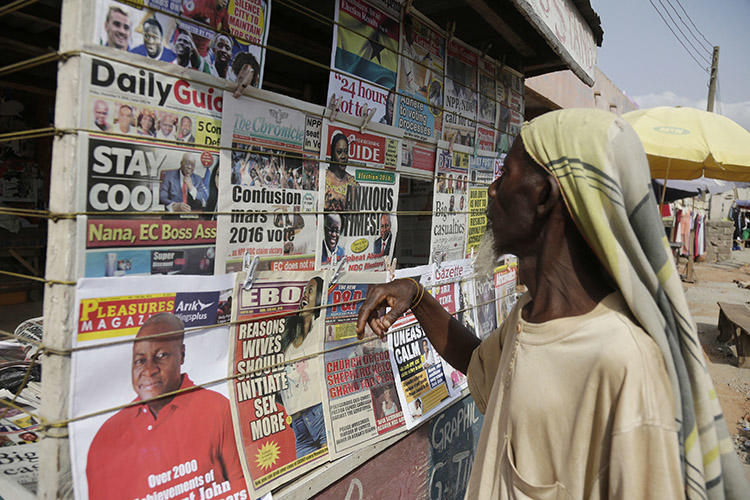New York, August 31, 2018–Ghanaian authorities should thoroughly investigate and bring to justice all those responsible for an attack on Jerry Azanduna, a reporter with the government-funded Ghana News Agency (GNA), and ensure his belongings are returned, the Committee to Protect Journalists said today.
Azanduna said that on August 27, a group of men tricked him into getting in a car by saying they would drive him to a press conference he had been told to attend. The men instead drove the journalist to the house of Hassan Ayariga, an opposition Ghanaian politician with the All People’s Congress party, who questioned him about a recent report by GNA before ordering the men to “teach him a lesson,” Azanduna said. The men beat the journalist and seized his phone, USB flash drive, and wallet, Azanduna and Eric Amoh, of the Ghana Journalist Association, told CPJ. The GNA reported on the attack the following day.
Ayariga denied to CPJ any involvement with any violence, but said that APC party members did bring Azanduna to his house on August 27.
“The attack on Jerry Azanduna is absolutely unacceptable and a stain on Ghana’s press freedom record,” said CPJ Africa Program Coordinator Angela Quintal in Johannesburg. “Ghanaian authorities must thoroughly investigate this attack and ensure all those responsible are held accountable.”
Azanduna told CPJ that at about 4 p.m. on the day of the attack, he received a phone call from someone who identified themselves as “concerned youth in Bawku,” asking him to attend a press conference where Ayariga would speak. When he arrived at the location of the supposed press conference in Bawku, in Ghana’s Upper East region, Azanduna said that a group of men said the location had changed and instructed him to join them in their car to go to the new venue. Azanduna told CPJ he recognized one of the men in the group and so did not suspect any problem with leaving his car and joining them.
Azanduna said that when he questioned why the vehicle was going in a different direction to where the men said they were heading, he was told to “shut up.” When Azanduna took out his phone to call for help, one of the men slapped him and confiscated his phone, the journalist said. Azanduna told CPJ he was driven to Ayariga’s home in Bawku, where the politician chastised him for his reporting, and said, “The story you did about me, do you know what it has cost me?” The journalist said Ayariga told the men to “teach me a lesson.”
Azanduna told CPJ the group beat him at the house until he fell unconscious. “I sustained injuries on my left arm and [my] right shoulder was dislocated. My ribs were hurt. My neck and my eyes were all sore,” he said.
Amoh, from the Ghana Journalist Association, told CPJ that security services rescued Azanduna after receiving a tip about the attack. The journalist was taken to the Bawku police station, where he filed a report before being taken to a hospital. Azanduna said he arrived at the hospital around 6 p.m. and was discharged around 11 p.m. on the day of the attack. He said he returned to the police station the next day to make a full statement.
Yao Tettegah, chief superintendent of the Bawku Divisional Police, told CPJ on August 31 that the investigation is ongoing and that police were trying to identify the attackers. When asked if police had identified a link between Ayariga and the attack, Tettegah said no.
When contacted by CPJ on August 31, Ayariga denied any involvement and said, “When I saw [Azanduna] in my house, I was very angry because I didn’t invite him to my house…At the time I saw him nobody beat him…He was sitting on the floor…He should not pretend [he was beaten].”
Ayariga told CPJ he questioned Azanduna at the house about his stories, at least one of which he said was inaccurate and should be retracted, and the politician said he thought the party members and Azanduna may have fought before arriving at his home. Ayariga said it is possible Azanduna was beaten after being taken away by soldiers, whom he said were at his home when the journalist arrived.
Ayariga told CPJ that he did not instruct the group of men to “teach [Azanduna] a lesson” or instigate any attack. He apologized on behalf of his party members for any altercation that may have taken place and said that he and the APC party do not believe in violence. Ayariga said the APC party would investigate any party members’ involvement in violence.
